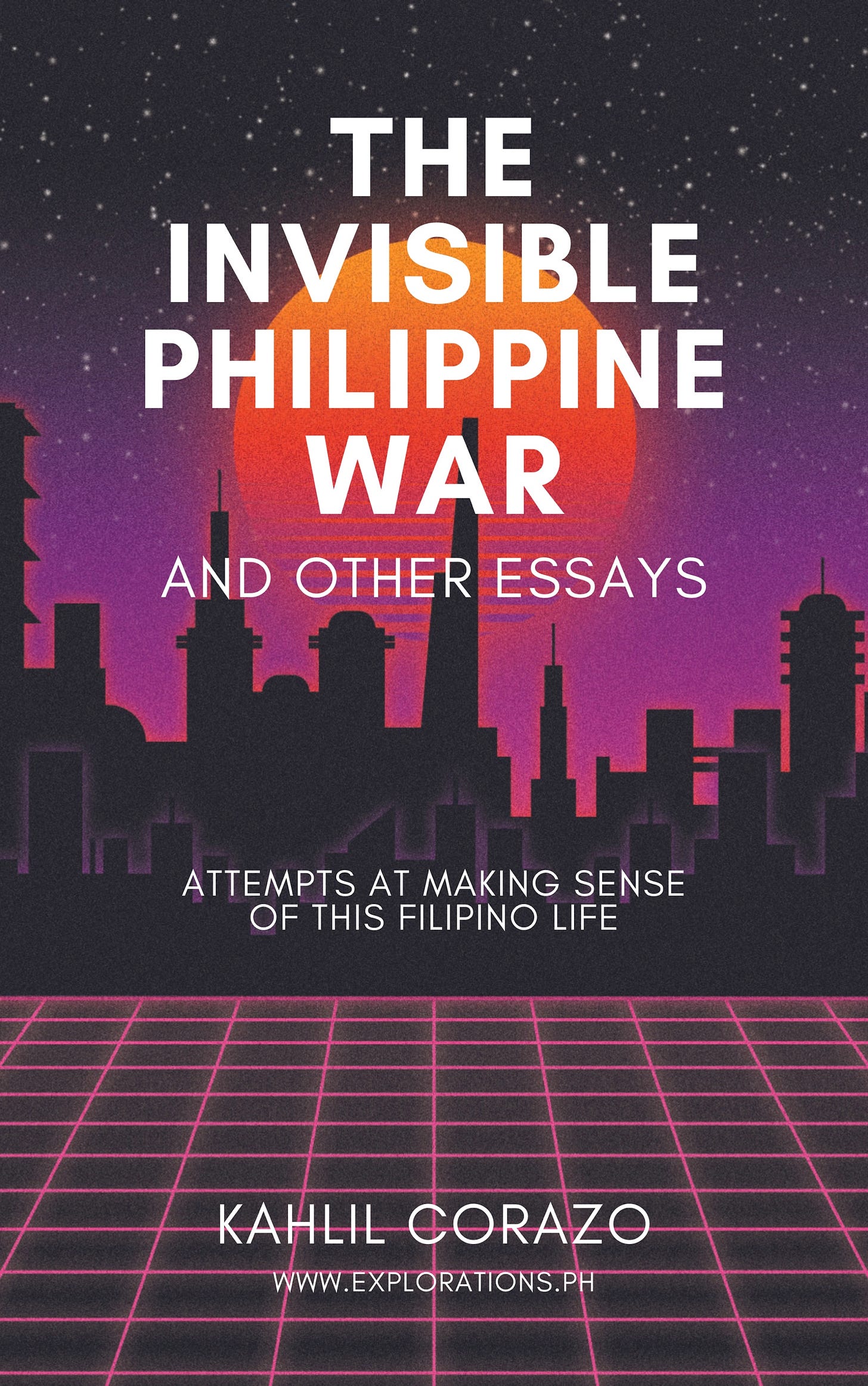New Book on the Filipino Experience!
The Invisible Philippine War and Other Essays: Attempts at Making Sense of This Filipino Life
I submitted a manuscript for this book to a local publisher. It's like a black hole. Not even an acknowledgment that they got the submission. This is normal, says my novelist friend. Apparently, I'll only find out if they want it in a couple of months. I thought I might as well publish the thing on Amazon in the meantime. I'll just take it down if needed.So, internet friends, this will be a limited edition! https://www.amazon.com/dp/B0DCC4VTNC (available in Kindle and paperback)If you do get it, I'd appreciate an Amazon review. This will help in getting the book into the hands of more people 🙏🏽Here's the preface:In the last chapter of Culture and History, Nick Joaquin asks, “What is the identity of the Filipino today?” He answers:
The identity of the Filipino today is of a person asking what is his identity.1
More than a definitive answer, this line points toward the generative power of the question. Culture and History sounds like it flowed from its author’s attempt to relieve our collective anxieties about our identity. The same inner tension must have fueled explorations of the Filipino experience through all sorts of artforms across our history as a nation. This has certainly been my experience. I woke up one day realizing that I have a number of essays written across two decades that attempt to make sense of this Filipino life. If you have also asked what it means to be Filipino, some of them might resonate with you.
I present eight of those essays in this collection. They are arranged into four pairs under the headings of Power, Language, Technology, and Machismo, but they can be read in any order. Listen to your curiosity.
Here's an overview:
I. Power. The opening essay, which bears the title of this collection, is an attempt to make sense of the return of the Marcoses to power in 2022. I was raised as an EDSA kid, so the results of that election shook me a bit, like many of the people around me. The usual explanation — disinformation — just did not feel complete, especially after talking to friends who voted for Marcos. History and a return to our ancestral animist lens helped me find a better answer.
The second essay tells of that time I first found out about the hidden game of power and wealth among our country's elites. If the first essay describes how the machinery of power in our country has rumbled forward in the past century, the second one opens the hood and exposes the engine that drives the invisible war.
II. Language. At some point in our history, the Philippine government decided that we needed a national language. Since then, non-Tagalogs have had an additional wrinkle to the question of what it means to be Filipino.
The third essay attempts to make sense of this problem by comparing Cebu with Barcelona. An early version of it was pseudonymously published in BITE, the short-lived Cebu art and lifestyle magazine, back in 2009.
I saw another angle seven years later. I remember putting it into words, as if possessed, during those rainy last days of 2016, between Christmas and New Year, in a Korean coffee shop on John Paul II Avenue. The resulting essay also explores the problem of the national language, but does so through a short history of the Cebu music scene.
III. Technology. Can new technologies help us make sense of culture? The two essays in this section attempt to do so.
The fifth essay uses data from Google Trends, the search giant's tool for reporting and comparing search behavior of countries and cities across the world. The essay was written in 2008 and uses data generated from that time. I regenerated all the reports as I worked on this collection. The results were much more ambiguous, with the rapid increase of internet access among many African countries. The new data were too complex for a lighthearted essay, so I left the original as it was, except for some light editing.
The sixth essay uses image generating artificial intelligence to answer the question, "What does the mother of the Santo Niño de Cebu look like?" Like the tension between mother tongue and national language, the Santo Niño is an unavoidable topic for a Cebuano writer.
IV. Machismo. The last two essays are not merely about Filipino machismo, but both touch on the question of what it means to be a Filipino man. I could have called this section “Trips,” since both happen to feature scenes wherein I'm riding in a car talking with the driver about drugs. They also came about from travel: one is from a trip to Manila, and the other to Mexico. The latter one is the most personal essay in this collection. Writing it, I have to confess, made me weep like a little girl.
Perhaps Nick Joaquin is right. We each experience being Filipino in our own unique way, and what brings us together is not some unchanging common characteristic, but our shared journey of making sense of this Filipino life. These essays are my contribution to this long-running conversation.
Nick Joaquin, Culture and History (Manila: Anvil Publishing, 2004), 397



This looks interesting! I’ll look it up.